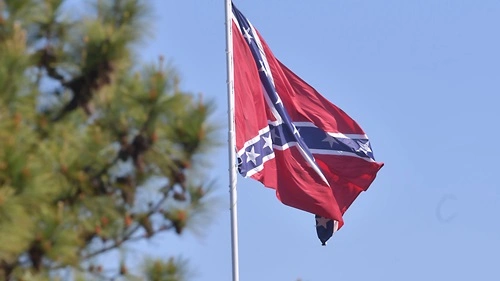No, it is not illegal to fly a Confederate flag in the United States. The First Amendment of the U.S. Constitution protects the right to freedom of expression, including the display of controversial symbols like the Confederate flag. However, the flag is a polarizing symbol, and its display often leads to debates about historical context, racism, and free speech.
Legal Protection for Flying the Confederate Flag
1. First Amendment Rights
- The First Amendment guarantees freedom of speech, which includes the right to display symbols, flags, and other expressions, even if they are offensive to others.
- Courts have consistently upheld that individuals have the right to display the Confederate flag on private property, vehicles, or clothing.
2. Private vs. Public Property
- Flying a Confederate flag on private property is fully protected under the law.
- On public property, such as government buildings, the rules are different. Many states and municipalities have banned the Confederate flag from being displayed on government-owned property due to its association with racism and slavery.
3. Employment and Workplace Context
- While displaying the flag is legal, private employers have the right to regulate employee behavior, including banning displays of controversial symbols in the workplace.
- If the flag causes disruptions or creates a hostile work environment, employers may impose restrictions.
Historical Context and Controversy
1. Symbolism of the Confederate Flag
- Supporters argue the flag represents Southern heritage and pride, particularly for descendants of Confederate soldiers.
- Critics view it as a symbol of racism, white supremacy, and the pro-slavery Confederacy during the Civil War.
2. Government Decisions
Following public outcry over racial injustice, many states and institutions have removed Confederate flags from public spaces. For example:
- South Carolina removed the flag from its statehouse grounds in 2015.
- Mississippi redesigned its state flag in 2020, removing the Confederate emblem.
Restrictions and Backlash
1. Public Schools and Universities
- Many public schools and universities have banned Confederate flags from campuses, citing concerns about inclusivity and preventing potential disruptions.
- Legal challenges to these bans have generally upheld the schools’ authority to maintain a safe and inclusive learning environment.
2. HOA and Community Rules
- Homeowners’ associations (HOAs) and some residential communities may have rules restricting the display of flags, including the Confederate flag.
- While such rules may be enforced, they must align with state laws and constitutional rights.
3. Public Opinion and Social Repercussions
While flying the Confederate flag is legal, it can lead to social backlash, including protests, criticism, and damage to personal or business reputations.
Legal Consequences and Misconceptions
1. No Criminal Penalty
- Flying a Confederate flag is not a criminal act in any state or under federal law.
- However, if the display of the flag is accompanied by illegal activity, such as trespassing or inciting violence, legal action may be taken.
2. Hate Speech Laws
While flying the flag is protected free speech, using it in conjunction with threats or violence may violate hate crime or harassment laws.
3. Property Disputes
If the flag is flown on property owned by someone else without permission, the property owner may take legal action for trespass or removal.
Common FAQs
Q1. Can I fly a Confederate flag on my property?
Ans: Yes, as long as it’s on private property, you have the right to display the flag under the First Amendment.
Q2. Is it legal to fly the Confederate flag on public property?
Ans: In most cases, no. Many states and municipalities have banned the flag on public property, especially government buildings.
Q3. Can schools ban Confederate flags?
Ans: Yes, schools can prohibit the flag if it causes disruption or creates a hostile environment.
Q4. Can my employer stop me from displaying the flag at work?
Ans: Yes, private employers can regulate behavior and ban displays of controversial symbols to maintain workplace harmony.
Q5. Are there any states where it is illegal to fly the Confederate flag?
Ans: No, no state has laws that outright ban individuals from displaying the Confederate flag.
Conclusion
Flying a Confederate flag is protected under U.S. constitutional law, but it remains a divisive issue in American society. While it is legal on private property and in certain contexts, its display can provoke strong social and political reactions. Understanding the legal and social implications of flying the Confederate flag is essential for navigating this contentious subject responsibly.


